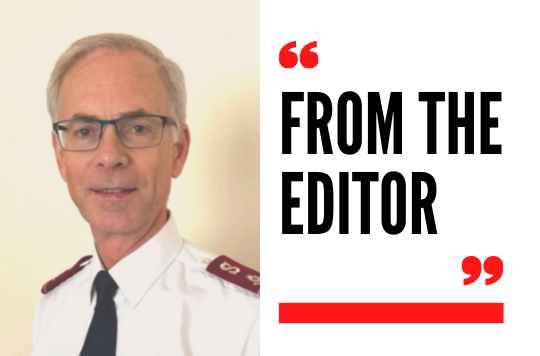Article of the week: Walk a mile in my shoes
10 April 2021
INTERVIEW
Jasper Meda talks to Lieut-Colonel Jonathan Roberts as part of a series of articles in which black, Asian and minority ethnic (BAME) Salvationists share their experiences
JASPER Meda, assistant corps sergeant-major at Croydon Citadel, was born in Zimbabwe, where he grew up in a Salvation Army family. In the 1980s Jasper settled in Harare, studying at the university, and is thought to have been the first black bandmaster of Harare City Corps Band.
After university he worked for the Ministry of Justice. ‘Part of the job was ensuring that children were treated fairly,’ he recalls. ‘Common areas of concern were inheritance and child arrangements in families. The other part of the job involved co-ordinating sales of immovable properties on behalf of creditors.’
The political and economic situation in Zimbabwe led Jasper and his family to move to the UK in 1998.
‘I had started a small business, which was doing very well. However, when the currency went into free fall, no matter how hard I worked the gross takings either stagnated or dwindled. This, coupled with other pressures in the country, made me feel it was the right time to leave.’
Arriving in the UK Jasper, with his wife and son, linked up with Nunhead Corps.
‘The welcome was what I would have expected from our international organisation,’ Jasper remembers. ‘On that first Sunday I met Alan Smith, who worked with the English Churches Housing Group. He soon found us a small flat.’
Jasper’s wife began training as a nurse and he became a carer at Rookstone, an Army care home in Sydenham, London. He progressed to senior carer in charge of a shift and trained as a social worker. After gaining a social work diploma he joined Greenwich social services.
‘I worked in the frontline safeguarding team,’ he says, ‘and while I was there completed a top-up year to turn my diploma into a degree. I then became part of a multidisciplinary team at Queen Elizabeth Hospital, Kidbrooke, which pioneered work with mental health challenges in pregnancy.’
Although Jasper progressed in his career, he describes how he was sidelined due to a failure to understand his background: ‘An issue arose within our office and a senior manager felt I should have acted as a whistle-blower. However, whistle-blowing is a difficult concept for me. In my younger years, Zimbabwe went through the War of Liberation and passing on information to either warring side had dire consequences, in most cases death.
‘Without seeking first to understand my actions, or lack thereof, I was sidelined for progression. My line manager a few years later asked why I had not progressed and, through her own investigation, uncovered this incident as the trigger behind my treatment. Frustrated, I asked my manager to convey this message, “Unless you have walked in my shoes, you need to be careful about the things you ask me to do.” If someone had taken the time to sit down and ask why I did not whistle-blow we could have arrived at better outcomes.’
Jasper eventually moved into a senior position and is now a locum team leader.
He also recalls experiences of being treated differently within the Army, such as when he or the Zimbabwean young people he led were prevented from taking on key roles at important events. He is glad that steps are now being taken to address racism within the Army and is conscious that it will cause disruption for some individuals and the status quo.
‘When you deal with the issue of racism it’s going to shake certain people the wrong way,’ he says. ‘But you need to feel a certain level of discomfort in order to move forward.
‘I’ve been to many meetings on intercultural issues, but no change has followed. So when I’m invited now I ask what the impact will be. I recently spoke to the Territorial Advisory Council and I’m glad that most of my suggestions, along with those of others, were incorporated into the recommendations to leadership.
‘Last year’s statement by the territorial leaders was a good benchmark: it set out what the Army is going to stand for and gave the opportunity for meaningful dialogue about otherness. The journey has started, and the statement has given it much-needed impetus.’
One proposal Jasper made is for a ‘truth and reconciliation’ style intervention when allegations of racism arise. Such issues could then be dealt with in a timely manner, similar to the response when children’s safeguarding incidents occur.
‘Within corps we could introduce people who are responsible for addressing these issues,’ he suggests. ‘This would prevent drift in resolving cases or mediating among the parties.’
Many black Salvationists who moved to the UK no longer attend because of the attitudes they have encountered. Jasper hopes that by addressing concerns the Army will be able to attract them back.
‘Most of these people have left because they didn’t feel welcome or appreciated. I guess a time will come when we can tell them there is a protocol for addressing racism and the Army is going to be a different experience for them.’

From the editor
An early look at the editor's comment

Salvationist
Salvationist is a weekly magazine for members and friends of The Salvation Army

The War Cry
The War Cry is packed with features, reviews, mouth-watering recipes, puzzles and more.